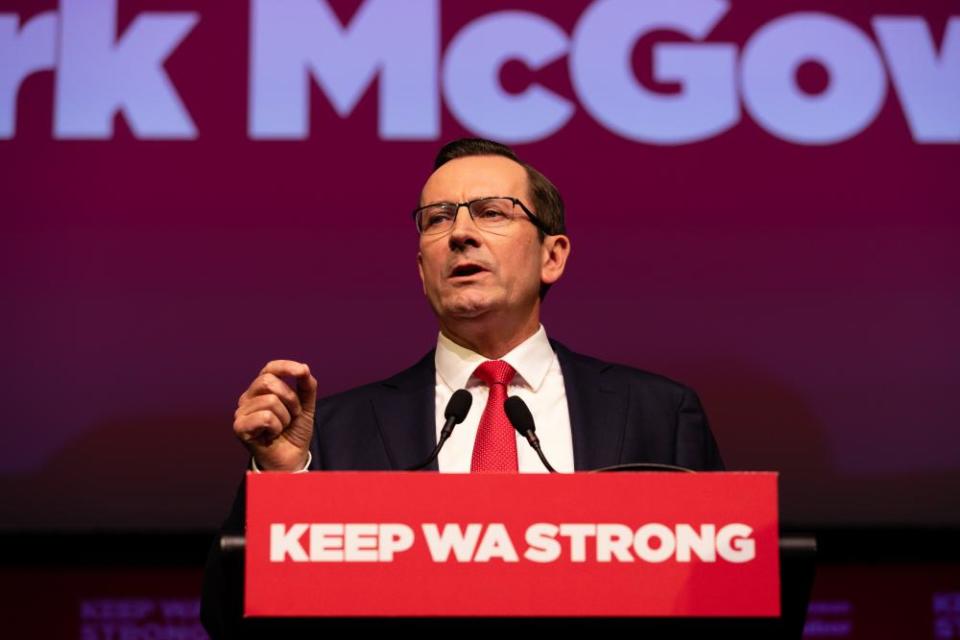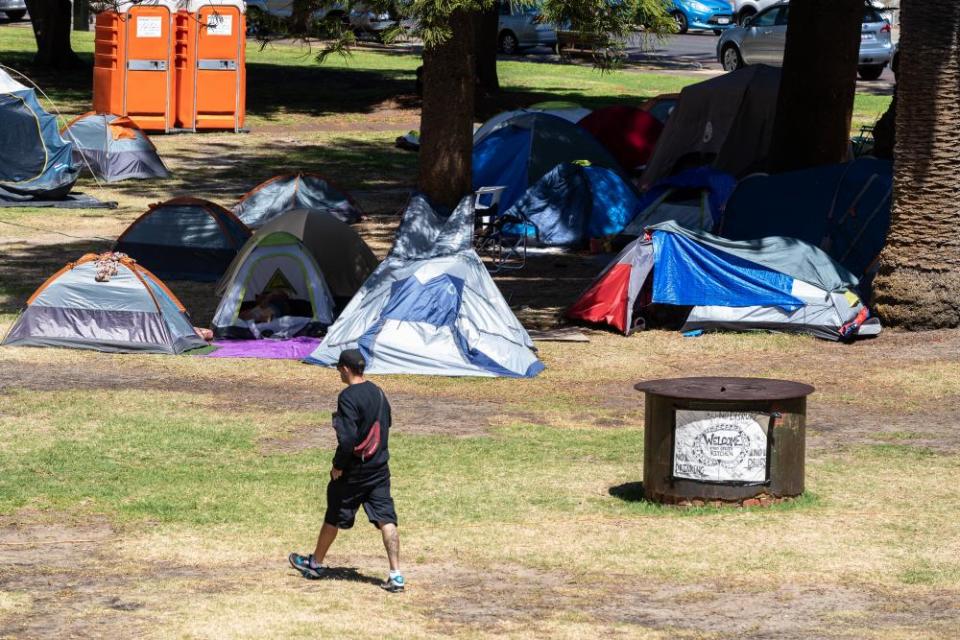Perth's homelessness crisis: the WA election issue Mark McGowan can't shake off

Just a few blocks from Western Australia’s parliament, dozens of vulnerable people have had to leave a city hotel and continue to face an uncertain future.
These are some of the people at the centre of Perth’s homelessness crisis, one of the few election issues on which WA’s “most popular premier in history”, Mark McGowan, does not control the narrative.
The homelessness issue was thrust into the public’s consciousness on Boxing Day, when up to 100 people set up camp in Fremantle’s Pioneer Park, starting a chain of events that would end with the hotel eviction in mid-February.
Dubbed “tent city”, the camp just yards from Fremantle’s busy station and bustling cappuccino strip became a beacon for rough sleepers and activist groups keen to shine a spotlight on the issue.
Related: Gospel according to Mark: can anything stop Western Australia’s Covid saviour's re-election?
It worked.
Media began telling the tragic stories of the camp’s occupants, which included pregnant women and the elderly. More came in mid-January, when another “tent city” under an overpass on the outskirts of Perth’s CBD was set alight.
Like its namesake, Fremantle’s tent city was soon at the centre of criminal allegations, including rape, beatings and robberies.
On 23 January the state government took control of the reserve from Fremantle council. The camp was dismantled and its inhabitants taken by bus to “emergency” accommodation in hotels and hostels across Perth.
McGowan said the people who had been living at the site were now in the hands of authorised support agencies after being lured to tent city by “anarchists” and activists under false pretences.
“We got reports people were being pulled out of supported accommodation on promises by the [Fremantle tent city] organisers they would get people a house immediately – you can’t have that where the organisers are making false promises to vulnerable people in order to cause disruption and trouble and therefore we intervened,” McGowan said.
The claim has been strongly denied by Jesse Noakes, one of the camp’s organisers.
The confrontation became more bitter when the government refused to pay the $20,000 hotel bill for 30 people who had been moved on from the tent city, claiming the rooms had been booked by activists and they should cover the costs.
McGowan promised to work with the people forced on to the streets as a result, but it only added to a string of ugly incidents that advocates say reflect poorly on his government’s efforts to tackle homelessness.

On 7 February McGowan had been forced to go back on a $14m promise to house 100 rough sleepers at a Perth City YHA hostel, after it was revealed his government had failed to secure a lease on the property – now listed for sale.
The premier blamed a stressful week of bushfires and Covid lockdowns, but admitted no one had followed up on the plan after it was approved by cabinet a week earlier.
Once the moratorium on evictions is lifted ... there is going to be a flood of people that will suddenly be homeless
Greens MP Alison Xamon
‘There is not enough social housing’
More than 9,000 people in Western Australia are homeless, according to the Bureau of Statistics, with 1,000 living on the streets.
In the past 12 months, the state’s public housing waiting list has ballooned by 2,000 to 14,890 applicants.
It’s a complex matter, but with a simple fact at its core: there are not enough houses for the people who need them.
“There is not enough social housing, there is not enough affordable housing, and we have this crisis response with people being put into hotels,” says the chief executive of Shelter WA, Michelle Mackenzie.
“It’s been a problem for many, many years, but the current government’s housing strategy will only increase social housing by 260 new homes a year over the next 10 years, which is just ridiculous.”

The housing minister, Peter Tinley, says his department has halved the time it takes to get people into homes since coming into government in March 2017, and has reduced the waitlist from 17,000.
But WA Greens MP Alison Xamon says Tinley has demolished more homes than his department has built or purchased, leaving 1,100 fewer social houses.
“It is fully anticipated that once the moratorium on evictions is lifted two weeks after polling day, there is going to be a flood of people that will suddenly be homeless and I think we are just going to have an awful lot of people sleeping in their cars,” Xamon says.
Tinley agrees 1,100 homes had been taken out of the housing pool, but says the government has stopped the decline and extended the residential tenacy “emergency period”, allowing tenants to apply for $2,000 in rent assistance to try to stop evictions.
“There is more to addressing the public housing waiting list than just building houses, we also provide bond and rental assistance among other measures to help people secure appropriate housing,” Tinley says.
But problems remain on numerous fronts.
In March 2020, when coronavirus became a crisis on Australia’s shores, the state began putting rough sleepers into hotels and hostels across the city, to protect them from potential infection.
Some of the 27 residents found more permanent accommodation, but more than half drifted back on to the streets within two weeks.
As the 13 March election draws closer, McGowan has promised to invest just under $49m in “targeted homelessness packages to support vulnerable people”.
The opposition leader, Zak Kirkup, has pledged to provide 500 beds within six months and $57.5m for interim accommodation for those experiencing homelessness.
“We have a homelessness crisis,” Kirkup said. “It is unacceptable that so many West Australians are rough sleeping each night.”
Xamon says Labor has “completely and totally dropped the ball on homelessness and social and community housing”.
“It is probably their weakest area when it comes to social justice.”
• This story was amended on 25 February 2021 to remove a reference to the involvement of charities in setting up the Fremantle tent city. The groups involved are not registered charities. It was further amended on 26 February to remove the suggestion that residents of the hotel were not offered alternative accommodation.

 Yahoo Finance
Yahoo Finance 